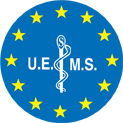Continuing Medical Education & Professional Development
From the ancient times of Hippocrates, doctors have promised to keep up-to-date their knowledge and skills. The importance of Continuing Medical Education (CME) and Continuing Professional Development (CPD) is self-evident to doctors.As progress in medicine becomes ever faster, the necessity to up-date ones knowledge is even greater. It has been estimated that about half of all medical knowledge is out of date within five years. It was the great Greek philosopher Socrates who stated:
"If you think that education is expensive, you should consider ignorance."
CME-CPD actually starts from the first day of medical school. However, the longest time in a doctor's career is the time following specialization. The actual importance of CME-CPD is most relevant during this period which may be 30 years long.
The objectives of UEMS include the promotion of quality patient care through the harmonisation and improvement in the quality of specialists' medical care throughout the European Union and the encouragement and facilitation of CME for European specialists. UEMS has been very active in the field of CME-CPD. Among the corner stones in this field are:
- The Charter on CME of Medical Specialists in the European Union from 1994,
- The Criteria for International Accreditation of CME from 1999,
- The Basel Declaration on CPD from 2001,
- The Declaration on Promoting Good Medical Care from 2004 and
- The Budapest Declaration on Ensuring the Quality of Medical Care from 2006.
- UEMS Statement : Impact of the COVID-19 pandemic on the CME-CPD of European Specialist Doctors from 2022.
The key message of all these documents is that CME-CPD is a moral and ethical obligation to doctors.
The medical directives of the EU followed by the directive on professional qualifications have mainly been concerned with basic medical education and postgraduate training. The EU has not demanded any mandatory system of CME-CPD at European level in spite of the fact that many individual Member States have created obligatory systems.
A major concern of the UEMS has been the structure and facilitation of accreditation of CME-CPD activities with the awarding of appropriate credits (hours) to individual medical specialists throughout Europe. The UEMS established the European Accreditation Council for CME (EACCME®) in order to give Europe a co-ordinated system to facilitate such activity, without encroaching on the responsibility of national organisations where they exist.
13 Dec 2013
